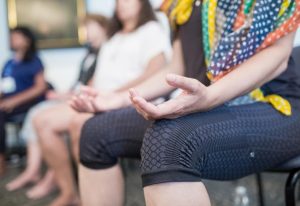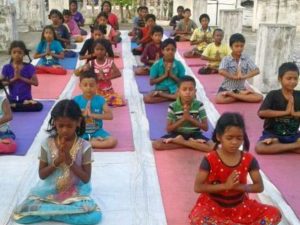Improve Mood in Patients with HIV with Mindfulness
By John M. de Castro, Ph.D.
“Given the stress-reduction benefits of mindfulness meditation training. . . there can be health protective effects not just in people with HIV but in folks who suffer from daily stress,” – David Creswell
More than 35 million people worldwide and 1.2 million people in the United States are living with HIV infection. These include a significant number of children and adolescents. In 1996, the advent of the protease inhibitor and the so-called cocktail changed the prognosis for HIV. Since this development a 20-year-old infected with HIV can now expect to live on average to age 69. Hence, living with HIV is a long-term reality for a very large group of people.
People living with HIV infection experience a wide array of physical and psychological symptoms which decrease their perceived quality of life. The symptoms include chronic pain, muscle aches, anxiety, depression, weakness, fear/worries, difficulty with concentration, concerns regarding the need to interact with a complex healthcare system, stigma, and the challenge to come to terms with a new identity as someone living with HIV. Mindfulness training has been shown to improve psychological well-being, lower depression and strengthen the immune system of patients with HIV infection.
In today’s Research News article “). A randomized, controlled trial of mindfulness-based stress reduction in HIV infection.” (See summary below or view the full text of the study at: https://www.ncbi.nlm.nih.gov/pmc/articles/PMC7656978/ ) Hecht and colleagues recruited adult patients with HIV who were not on antiretroviral therapy and randomly assigned to receive 8 weeks of either Mindfulness-Based Stress Reduction (MBSR) or education on managing HIV. The MBSR program met once a week for 2.5 hours and included meditation, body scan, and yoga practice, daily home practice, and discussion. HIV management education met once a week for 1,5 hours. The participants were measured before and after training and 3 and 9 months later for depression, positive and negative emotions, perceived stress, and mindfulness. In addition, blood was drawn and assayed for CD-4+ T cell counts, viral load, and the inflammatory markers of C-reactive protein, D-dimer, and Interleukin 6.
They found that both groups decreased in CD-4+ T cell counts over the 12 months of the study with no change in viral load or the inflammatory markers. The group that received Mindfulness-Based Stress Reduction (MBSR) had significant reductions in depression and perceived stress and increases in positive emotions 3 months but not 12 months after training. There were no significant improvements in the HIV education group. Mindfulness increased significantly in the MBSR group and was sustained at the 9 month follow-up.
The lack of effectiveness of Mindfulness-Based Stress Reduction (MBSR) on CD4+ T-cell counts and viral load in comparison to HIV education were disappointing. Previous studies had found that mindfulness training improved these measures. The authors attributed this to their having a more active control condition than previous studies. As a result, they cautioned against making inferences about mindfulness training effectiveness without an equivalent active control condition.
On the other hand, the study found that Mindfulness-Based Stress Reduction (MBSR) produced improvements in the psychological state of the patients which lasted for 3 months after the conclusion of training but tended to wane thereafter. These results are not surprising as improvements in depression, positive emotions, and perceived stress as a result of mindfulness training have been routinely reported in prior research. Hence, mindfulness training appears to improve the mood but not the HIV infection or inflammatory responses of HIV patients.
So, improve mood in patients with HIV with mindfulness.
“The results also support a role for MBSR in enhancing problem solving, life-satisfaction, and emotional regulation in youth with HIV-infection.” – AMRA
CMCS – Center for Mindfulness and Contemplative Studies
This and other Contemplative Studies posts are also available on Google+ https://plus.google.com/106784388191201299496/posts and on Twitter @MindfulResearch
Study Summary
Hecht, F. M., Moskowitz, J. T., Moran, P., Epel, E. S., Bacchetti, P., Acree, M., Kemeny, M. E., Mendes, W. B., Duncan, L. G., Weng, H., Levy, J. A., Deeks, S. G., & Folkman, S. (2018). A randomized, controlled trial of mindfulness-based stress reduction in HIV infection. Brain, behavior, and immunity, 73, 331–339. https://doi.org/10.1016/j.bbi.2018.05.017
Abstract
Objective:
Evidence links depression and stress to more rapid progression of HIV-1 disease. We conducted a randomized controlled trial to test whether an intervention aimed at improving stress management and emotion regulation, mindfulness-based stress reduction (MBSR), would improve immunological (i.e. CD4+ t-cell counts) and psychological outcomes in persons with HIV-1 infection.
Methods:
We randomly assigned participants with HIV-1 infection and CD4 T-cell counts > 350 cells/μl who were not on antiretroviral therapy in a 1:1 ratio to either an MBSR group (n=89) or an HIV disease self-management skills group (n=88). The study was conducted at the University of California at San Francisco. We assessed immunologic (CD4, c-reactive protein, IL-6, and d-dimer) and psychological measures (Beck Depression Inventory for depression, modified Differential Emotions Scale for positive and negative affect, Perceived stress-scale, and mindfulness) at 3, 6 and 12 months after initiation of the intervention; we used multiple imputation to address missing values.
Results:
We observed statistically significant improvements from baseline to 3-months within the MBSR group in depression, positive and negative affect, perceived stress, and mindfulness; between group differences in change were significantly greater in the MBSR group only for positive affect (per item difference on DES-positive 0.25, 95% CI 0.049, 0.44, p = .015). By 12 months the between group difference in positive affect was not statistically significant, although both groups had trends toward improvements compared to baseline in several psychological outcomes that were maintained at 12-months; these improvements were only statistically significant for depression and negative affect in the MBSR group and perceived stress for the control group. The groups did not differ significantly on rates of antiretroviral therapy initiation (MBSR = 39%, control = 29%, p = .22). After 12 months, the mean decrease in CD4+ T-cell count was 49.6 cells/μl in participants in the MBSR arm, compared to 54.2 cells/μl in the control group, a difference of 4.6 cells favoring the MBSR group (95% CI, −44.6, 53.7, p=.85). The between group differences in other immunologic-related outcomes (c-reactive protein, IL-6, HIV-1 viral load, and d-dimer) were not statistically significant at any time point.
Conclusions:
MBSR improved positive affect more than an active control arm in the 3 months following the start of the intervention. However, this difference was not maintained over the 12-month follow-up and there were no significant differences in immunologic outcomes between intervention groups. These results emphasize the need for further carefully designed research if we are to translate evidence linking psychological states to immunological outcomes into evidence-based clinical practices.
https://www.ncbi.nlm.nih.gov/pmc/articles/PMC7656978/









